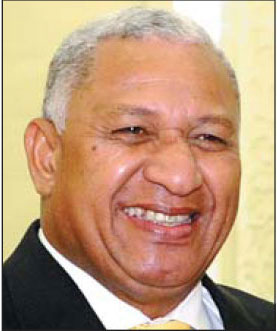Fiji's PM sees opportunity in China
 |
|
Josaia Voreqe Bainimarama, Fijian Prime minister |
Instead of concentrating on needless worries about a rising China, Fiji is capitalizing on the opportunities that China brings and is strengthening its partnership with Beijing in every possible sphere, the country's prime minister told China Daily on Thursday.
Fijian Prime Minister Josaia Voreqe Bainimarama, the first Pacific island nation leader to visit Beijing since China's new leadership came to power, said he does not agree with criticism about China's rising influence in the Pacific.
"I think it depends on how one sees it," he said.
Some commentators have suggested that by expanding its economic and diplomatic clout in the Pacific, Beijing is "locking" strategic natural resources there and competing with Washington for the international space.
"Some cannot believe that being a developing country, China is the second-largest economy in the world. Some view China as a threat from its military buildup, its relations with the world and its influence, whilst some just lack understanding of China and its development," Bainimarama said.
And some fear that China's model of political and economic development will undermine Western efforts in other parts of the world, especially in Africa and the Pacific, he added.
"I am confident that the more people know and understand China, their view will also change."
Calling China a "true friend", Bainimarama said Fiji is grateful for China's long-term support and understanding.
He arrived on Tuesday and met President Xi Jinping and Premier Li Keqiang the next day. He told the Chinese leaders that Fiji will make China a key part of its "Look North Policy".
He told Li on Wednesday that China has long trusted and respected his country, and thanked Beijing for help over the years in various areas including agriculture, fisheries and infrastructure construction.
Beijing has long kept good ties with the Pacific country, which was the first nation in the Pacific islands region to establish diplomatic relations with China.
In September, then Chinese top legislator Wu Bangguo also visited the island country.
"Instead of worrying about it, Fiji is capitalizing on the opportunity to strengthen her partnership with China on all fronts - economic, political and social," Bainimarama said.
He said Fiji accepts that China is the world's fastest growing major economy, and its continued growth is critical to the overall health of the world economy.
Among Fiji's sectors most eager for cooperation with the Chinese is its pillar tourism industry, which is famous for island scenery and tropical rain forests.
In 2008, Fiji registered around 8,000 arrivals from China, while the corresponding number surged to more than 30,000 in 2012, according to the prime minister. Fiji has exempted Chinese from obtaining visas to enter the country.
"We are confident that the more the Chinese people know about Fiji, the more tourists will visit our shores," Bainimarama said.
Fiji is also looking to China for capital, technology and markets, he said. "And we look forward to learn and benefit from China's skill and know-how in fields of specialization."


















